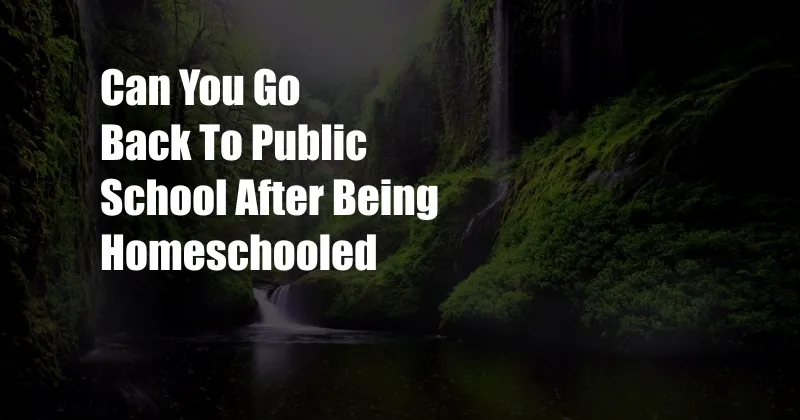
Can You Go Back to Public School After Being Homeschooled?
The decision to homeschool can be a daunting one, and it’s important to know that you’re not alone. According to the National Center for Education Statistics, there were over 2.5 million homeschooled students in the United States in 2019. That’s a lot of kids! And with so many different reasons for homeschooling, it’s no wonder that families are wondering if they can go back to public school if they change their minds.
The answer is yes, you can go back to public school after being homeschooled. However, the process may vary depending on your state and district. In some cases, you may need to take a placement test to determine your academic level. In other cases, you may be able to simply enroll in the grade that you would have been in if you had never been homeschooled.
Transitioning from Homeschool to Public School
Transitioning from homeschool to public school can be a big change for both children and parents. Here are a few tips to make the transition as smooth as possible:
- Start by talking to your child about their expectations. What are they looking forward to about going to public school? What are they worried about?
- Visit the school with your child before the first day. This will help them get familiar with the building and the staff.
- Ease your child into the public school routine gradually. If possible, start by sending them to school for just a few hours each day.
- Be patient and supportive. It may take your child some time to adjust to the new environment.
Benefits of Public School
There are many benefits to sending your child to public school. These benefits include:
- Socialization. Public school provides an opportunity for children to interact with other children their age. This can help them develop social skills, learn how to cooperate with others, and make friends.
- Structured learning environment. Public schools provide a structured learning environment that can help children develop good study habits and learn how to manage their time.
- Access to resources. Public schools have access to a variety of resources that can help children learn, such as libraries, computers, and science labs.
Challenges of Public School
There are also some challenges to sending your child to public school. These challenges include:
- Bullying. Bullying is a problem in many public schools. It’s important to talk to your child about bullying and how to deal with it.
- Large class sizes. Public school classes can be large, which can make it difficult for children to get the individual attention they need.
- Lack of flexibility. Public schools have a set curriculum and schedule, which can be difficult for some children to follow.
Ultimately, the decision of whether or not to send your child to public school is a personal one. There are many factors to consider, such as your child’s age, personality, and learning style. If you’re considering sending your child to public school, it’s important to do your research and talk to other parents who have homeschooled their children.
FAQs
Q: Can I homeschool my child part-time?
A: Yes, in most states, you can homeschool your child part-time. This means that your child can attend public school for some subjects and homeschool for others.
Q: What are the legal requirements for homeschooling?
A: The legal requirements for homeschooling vary from state to state. In general, you must notify the state that you are homeschooling your child and provide evidence that you are providing your child with an adequate education.
Q: What are the different types of homeschooling?
A: There are many different types of homeschooling, including traditional homeschooling, unschooling, and online homeschooling. The type of homeschooling that you choose will depend on your child’s learning style and your family’s needs.
Q: What are the benefits of homeschooling?
A: There are many benefits to homeschooling, including the ability to tailor your child’s education to their individual needs, provide a more flexible learning environment, and promote family bonding.
Q: What are the challenges of homeschooling?
A: There are also some challenges to homeschooling, including the need to be self-motivated, the lack of social interaction, and the financial cost.
Conclusion
Homeschooling can be a great option for families who want to provide their children with a unique and individualized education. However, it’s important to remember that homeschooling is not for everyone. If you’re considering homeschooling your child, it’s important to do your research and talk to other parents who have homeschooled their children. Are you interested in learning more about homeschooling?